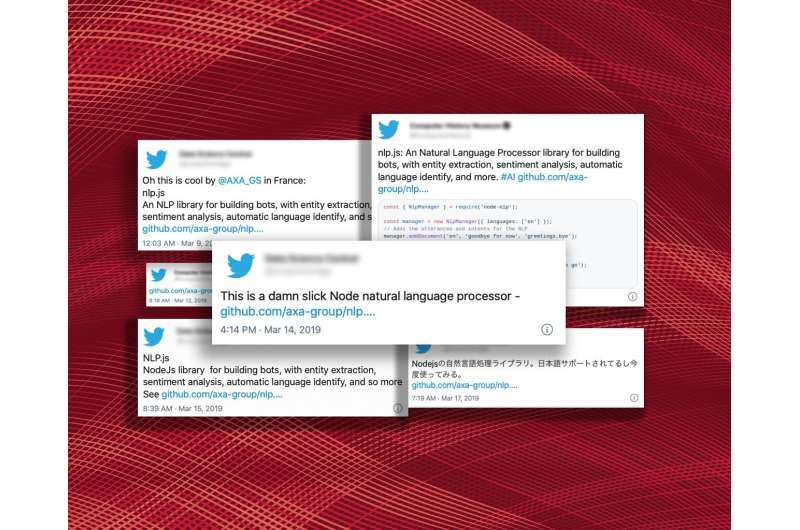Research shows Twitter drives popularity, contributors to open-source software

Want to be popular with lots of friends? Get out there and tweet. That advice holds true for open-source software projects as well, according to a new study.
Led by Hongbo Fang, a Ph.D., the research team found that Twitter is an effective way to attract more attention and contributors to open-source projects on GitHub. Fang presented the study, “‘This Is Damn Slick!’ Estimating the Impact of Tweets on Open-Source Project Popularity and New Contributors,” at the International Conference on Software Engineering, where the research won a Distinguished Paper award.
The study showed that tweeting about a project produced on average a 7% increase in popularity—at least one star on GitHub—and generated a 2% increase in the number of contributors. The more tweets about a project, the more stars and contributors it gained.
“We have realized that social media has become more and more important in open-source communities,” Fang said. “Attracting attention and new contributors will lead to higher quality and better software.”
For the most part, open-source software is developed and maintained by volunteers. The more people working on a project, the better the result. Developers and others use the software, report issues and work to fix those issues. Unpopular projects risk not receiving the attention they require.
This mostly all-volunteer workforce maintains software that millions of people use every day. For example, nearly any HTTPS website uses open-source OpenSSL to secure its content. A security bug, Heartbleed, found in OpenSSL cost businesses millions of dollars to fix after it was reported in 2014. Another piece of open-source software, cURL, allows connected devices to send data to each other and runs on about 1 billion devices. And the list goes on and on.
“Can you name a piece of technology that doesn’t use some open-source software?” asked Bogdan Vasilescu, an associate professor in ISR and Fang’s advisor. “All the apps on your phone and all the companies that make them use open-source software. The question is, where can’t you find open-source?”
Fang’s research into Twitter’s impact on increasing an open-source project’s popularity and attracting new contributors is part of a body of work in Vasilescu’s Socio-Technical Research Using Data Excavation Lab (STRUDEL) that looks at how to make the open-source community and its work more sustainable. Open-source software is the digital infrastructure, the roads and bridges underlying modern technology. Without sustainable maintenance, that infrastructure can crumble.
“People have realized how important open-source is and how at risk some of these projects are of being abandoned or not maintained,” Vasilescu said. “There are a million ideas out there about how to make open-source better. People have opinions and often disagree over these ideas because there is no hard science that looks at what is actually effective.”
The researchers studied 44,544 tweets containing links to 2,370 open-source GitHub repositories for evidence that the tweets caused the projects to attract new stars and contributors. The team took a scientific approach to the research, comparing the gain in stars and contributors of GitHub projects mentioned on Twitter against a control group of projects not mentioned on Twitter.
The study also outlined the characteristics of high-impact tweets, the type of people likely attracted to a project by the posts, and how those people differ from contributors attracted through other means. Tweets coming from fans of a project and not developers themselves work best to attract attention. Posts asking for help with a specific task or project get a better response. New contributors attracted by tweets tend to be newer to GitHub but aren’t less-experienced programmers. And new interest may not translate into new help.
“Tweets tend to attract more community attention via stars than actual developers,” Fang said. “More people know about a project, but they don’t necessarily commit to working on it.”
This gap between attention and action is one of the potential downsides of increasing a project’s popularity that the researchers discuss. More attention often leads to more feature requests or issue reports but not more developers to address them. Increased popularity on social media can lead to more trolls or toxic behavior around the project.
Software for all: How do open-source communities work?
Paper: cmustrudel.github.io/papers/fang2022twitter.pdf
Conference: conf.researchr.org/home/icse-2022
Citation:
Research shows Twitter drives popularity, contributors to open-source software (2022, June 14)
retrieved 14 June 2022
from https://techxplore.com/news/2022-06-twitter-popularity-contributors-open-source-software.html
This document is subject to copyright. Apart from any fair dealing for the purpose of private study or research, no
part may be reproduced without the written permission. The content is provided for information purposes only.
For all the latest Technology News Click Here
For the latest news and updates, follow us on Google News.
